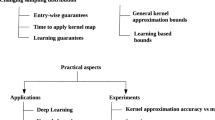Abstract
The traditional multiple kernel learning (MKL) is usually based on implicit kernel mapping and adopts a certain combination of kernels instead of a single kernel. MKL has been demonstrated to have a significant advantage to the single-kernel learning. Although MKL sets different weights to different kernels, the weights are not changed over the whole input space. This weight setting might not been fit for those data with some underlying local distributions. In order to solve this problem, Gönen and Alpaydın (2008) introduced a localizing gating model into the traditional MKL framework so as to assign different weights to a kernel in different regions of the input space. In this paper, we also integrate the localizing gating model into our previous work named MultiK-MHKS that is an effective multiple empirical kernel learning. In doing so, we can get multiple localized empirical kernel learning named MLEKL. Our contribution is that we first establish a localized formulation in the empirical kernel learning framework. The experimental results on benchmark data sets validate the effectiveness of the proposed MLEKL.
Similar content being viewed by others
Explore related subjects
Discover the latest articles, news and stories from top researchers in related subjects.References
Bach F, Lanckriet GRG, Jordan MI (2004) Multiple kernel learning, conic duality, and the SMO algorithm. In: Proceedings of the 21st international conference on machine learning
Cataltepe Z, Abu-Mostafa Y, Magdon-Ismail M (1999) No free lunch for early stopping. Neural Comput 11:995–1009
Chapelle O, Vapnik V, Bousquet O, Mukherjee S (2002) Choosing multiple parameters for support vector machines. Mach Learn 46(1–3):131–159
Collobert R, Bengio S (2004) Links between perceptrons mlps and svms. In: ICML
Duda R, Hart R, Stock D (2001) Pattern classification, 2nd edn. Wiley, London
Frank A, Asuncion A (2010) UCI machine learning repository
Gönen M, Alpaydın E (2011) Regularizing multiple kernel learning using response surface methodology. Pattern Recognit 44(1):159–171
Gönen M, Alpaydın E (2008) Localized multiple kernel learning. In: Proceedings of the 25th international conference on machine learning. New York, pp 352–359
Hagiwara K (2002) Regularization learning, early stopping and biased estimator. Neurocomputing 48(1-4):937–955
Kim SJ, Magnani A, Boyd S (2006) Optimal kernel selection in kernel fisher discriminant analysis. In: Proceedings of the 23rd international conference on machine learning, pp 465–472
Krebel U (1999) Pairwise classification and support vector machines. Advances in kernel methods: support vector learning, pp 255–268
Lanckriet GRG, Cristianini N, Bartlett P, Ghaoui LE, Jordan MI (2004) Learning the kernel matrix with semidefinite programming. J Mach Learn Res 5:27–72
Leski J (2003) Ho-kashyap classifier with generalization control. Pattern Recognit Lett 24(14):2281–2290
Mitchell TM (1997) Machine Learning. McGraw-Hill, Boston
Momma M, Bennett K (2002) A pattern search method for model selection of support vector regression. In: Proceedings of the second SIAM international conference on data mining. SIAM, pp 261–274
Muller K-R, Mika S, Ratsch G, Tsuda K, Scholkopf B (2001) An introduction to kernel-based learning algorithms. IEEE Trans Neural Netw 12(2):181–202
Prechelt L (1998) Early stopping-but when? In: Lecture notes comput science, pp 55–69
Scholkopf B, Mika S, Burges CJC, Knirsch P, Muller K-R, Ratsch G, Smola AJ (1999) Input space versus feature space in kernel-based methods. IEEE Trans Neural Netw 10(5):1000–1017
Shawe-Taylor J, Cristianini N (2004) Kernel methods for pattern analysis. Cambridge University Press, Cambridge
Sonnenburg S, Ratsch G, Schafer C (2006) A general and efficient multiple kernel learning algorithm. In: Weiss Y, Schölkopf B, Platt J (eds) In advances in neural information processing systems, vol 18, pp 1273–1280
Sonnenburg S, Ratsch G, Schafer C, Scholkopf B (2006) Large scale multiple kernel learning. J Mach Learn Res 7:1531–1565
Tsang I, Kocsor A, Kwok J (2006) Efficient kernel feature extraction for massive data sets. In: International conference on knowledge discovery and data mining
Vapnik V (1998) Statistical learning theory. Wiley, London
Wang Z, Chen S, Sun T (2008) Multik-mhks: A novel multiple kernel learning algorithm. IEEE Trans Pattern Anal Mach Intell 30:348–353
Wu J, Zhang XL (2011) Efficient multiple kernel support vector machine based voice activity detection. IEEE Signal Process Lett 18(8):466–469
Xiong H, Swamy MNS, Ahmad MO (2005) Optimizing the kernel in the empirical feature space. IEEE Trans Neural Netw 16(2):460–474
Xu QS, Liang YZ (2001) Monte carlo cross validation. Chemom Intell Lab Syst 56:1–11
Yan F, Kittler J, Mikolajczyk K, Tahir (2009) A non-sparse multiple kernel learning for fisher discriminant analysis. IEEE international conference on data mining
Yan F, Mikolajczyk K, Barnard M, Cai H, Kittler J (2010) ℓ p norm multiple kernel fisher discriminant analysis for object and image categorisation. In: International conference on computer vision and pattern recognition
Ye J, Ji S, Chen J (2008) Multi-class discriminant kernel learning via convex programming. J Mach Learn Res 9:719–758
Zhang DQ, Zhou ZH, Chen SC (2006) Adaptive kernel principal component analysis with unsupervised learning of kernels. In: Proceedings of the 6th IEEE international conference on data mining (ICDM’06), Hong Kong, China, pp 1178–1182
Acknowledgments
The authors thank Natural Science Foundations of China under Grant No. 60903091, 61272198, and 21176077, the Specialized Research Fund for the Doctoral Program of Higher Education under Grant No. 20090074120003 for support.
Author information
Authors and Affiliations
Corresponding author
Rights and permissions
About this article
Cite this article
Wang, Z., Xu, J., Gao, D. et al. Multiple empirical kernel learning based on local information. Neural Comput & Applic 23, 2113–2120 (2013). https://doi.org/10.1007/s00521-012-1161-5
Received:
Accepted:
Published:
Issue Date:
DOI: https://doi.org/10.1007/s00521-012-1161-5




